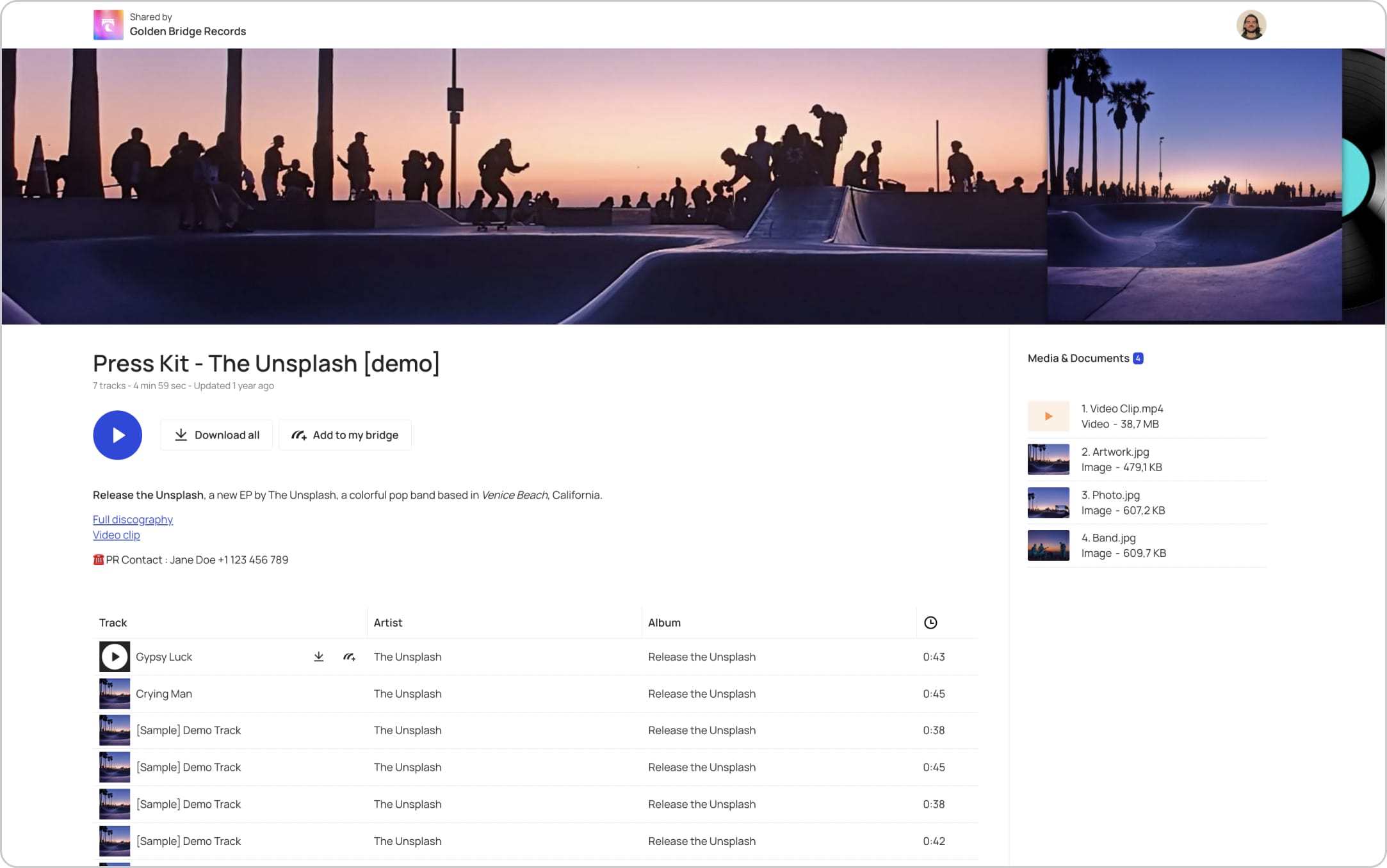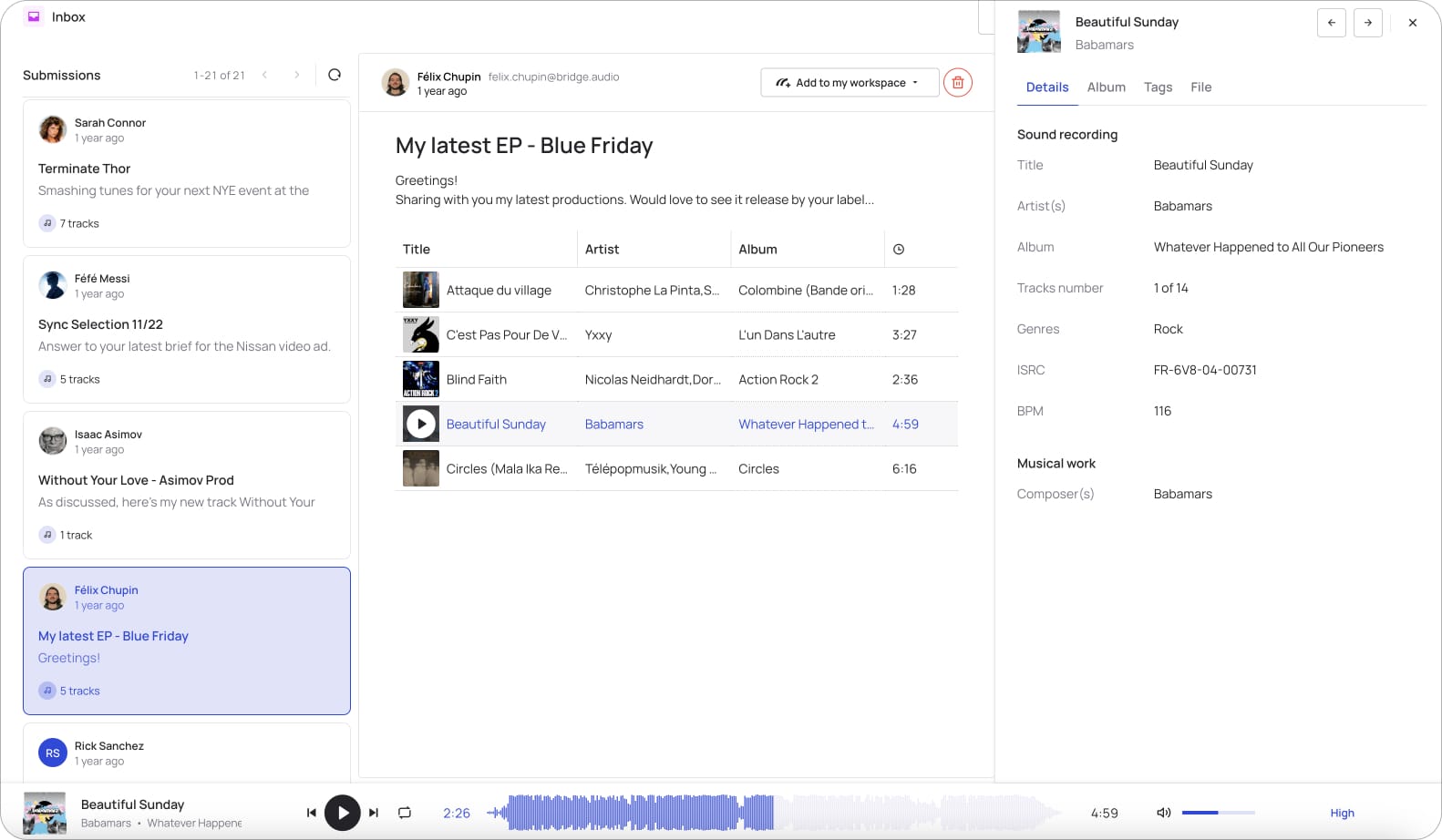Pro Tips
How to send music to a Label or a Publisher as an upcoming artist

In the dynamic world of music, getting recognized is every artist’s dream. But when and why should one approach a label or publisher with their music? Ideally, when an artist believes they have crafted a track or album that mirrors their authentic voice and has potential mass appeal, it’s time to share it. Labels and publishers are gatekeepers to vast networks, financial resources, and industry expertise.
They can amplify your music, manage its distribution, and introduce you to a global audience. Moreover, a good publisher ensures your music finds its place in movies, TV shows, or advertisements, securing additional revenue streams. However, it’s essential that artists approach these entities not out of desperation, but from a position of confidence and preparedness. Sending your music is not just about seeking validation but about partnering with professionals who can propel your artistry to new heights.
Understanding Record Labels and Music Publishers:
When it comes to music, record labels and music publishers play crucial roles. A record label is primarily involved in the production, marketing, and distribution of recorded tracks. On the other hand, a music publisher manages the copyrights of musical compositions, ensuring they’re licensed appropriately and that artists get their due.
Why Submit Music to Labels and Publishers?:
You might wonder, “Why should I even consider sending my music?” Well, partnering with a label or publisher can open doors. They can:
Boost your music’s reach to a wider audience.Labels and publishers have the resources to promote your music to a wider audience through marketing, distribution, and other channels. This can help you get your music heard by more people and build a fan base.
Handle intricate business aspects, from marketing to distribution. Labels and publishers can handle the intricate business aspects of the music industry, such as copyright, licensing, and publishing. This can free up your time so you can focus on creating music.
Offer financial support and resources crucial for career growth. Labels and publishers can offer financial support and resources to help you grow your career. This could include funding for recording, touring, and marketing.

Choosing the Label/Publisher:
Before you dive in, it’s vital to choose a label or publisher that aligns with your aspirations. Consider these:
Roster of artists: Does the label house artists that resonate with your style or genre? This is a good indicator of the label’s taste and what they are looking for in an artist. If you can see yourself fitting in with the label’s roster, it’s a good sign that they might be a good fit for you.
Track record: Has the label or publisher made significant strides in the industry? Look at their past successes and see if they have a history of helping artists achieve their goals. This is a good way to gauge their level of experience and expertise.
Resources: What support, be it in marketing or promotions, can they offer? The label or publisher should be able to provide you with the resources you need to reach your target audience and grow your career. This could include things like marketing and promotion, distribution, and financial support.
Vision alignment: It’s essential that the label or publisher understands and shares your musical goals. Make sure you are on the same page about what you want to achieve with your music career. This will help ensure that you have a productive and mutually beneficial relationship.
In addition to these factors, it is also important to do your research and read reviews from other artists who have worked with the label or publisher. This can give you a good sense of what to expect and whether they are a good fit for you.
Feel free to go through our label directory to search labels according to genre or location.
Preparing Your Music for a Label/Publisher:
First impressions matter. When submitting your music to a label or publisher, it is important to make sure that it is the best representation of your talent. Here are some tips: Quality: Your music should be well-recorded, mixed, and mastered. This means that it should sound professional and polished. If you are not sure how to do this, you can hire a professional engineer or producer to help you.
Packaging: Your music should be easy for the label or publisher to listen to. This means that you should offer it in a format that is easily accessible, such as a Bridge.audio link. You can also send a physical CD, but this is less common these days.
Introduction: A succinct cover letter and bio can provide context about you and your musical journey. The cover letter should introduce yourself and your music, and the bio should give the label or publisher a brief overview of your musical background and experience.
In addition to these tips, it is also important to follow the label or publisher’s submission guidelines. Most labels and publishers have specific requirements for submitting music, such as the format of the files and the length of the bio. By following these guidelines, you can show the label or publisher that you are serious about getting your music heard.
Having an Electronic Press Kit (EPK) is the best way to polish what you send to a label. Using Bridge you can craft your own personalized EPK and track who’s looked at it at who listened to your tracks !

Submission Process:
Now that you have prepared your music and chosen a label or publisher, it is time to start the submission process. Here are some things to keep in mind:
Stick to the label or publisher’s submission protocols. This shows professionalism and that you have taken the time to read their guidelines. Most labels and publishers have specific requirements for submitting music, such as the format of the files and the length of the bio. By following these guidelines, you can show the label or publisher that you are serious about getting your music heard.
Be courteous and professional in your communication. This means using a polite and respectful tone in your emails and correspondence. It also means being patient and understanding if the label or publisher takes some time to respond.
Be persistent, but not annoying. It is important to follow up with the label or publisher after you have submitted your music. However, it is also important to be respectful of their time and not to bombard them with emails.
With Bridge, you can track down everyhting that happends on the links you share. It is the perfect way to know if a label or a music publisher has listened to your tracks or not yet. It avoids you sending follow ups while they are working on your “application” 😉
You can also send music to labels via Bridge.audio! Labels using Bridge have an inbox where you can send them your tracks easily. Scroll through our label directory to find such labels!
Once submitted, labels and music publishers will be able to listen to your track directly from their Bridge workspace and download the music file if they need to.
Labels will have the possibility to add your submission to their workspace in a click and be able to come back to it and find it easily to listen to it. They will be able to see the metadata of your tracks and use them to contact them if needed.

Amplifying Your Music’s Reach:
While you are waiting for feedback from labels or publishers, it is important to keep promoting yourself and your music. Here are some ways to do that:
Digital footprint: Your online presence is essential for promoting your music. Make sure you have a website that is up-to-date and easy to navigate. You should also be active on social media and share your music regularly. Make sure your tracks are on popular streaming platforms, such as Spotify, Apple Music, and YouTube Music.
Networking: Get to know other artists and industry professionals. Attend industry events, meet people, and let them know about your music. A simple introduction can lead to unexpected opportunities.
Live gigs: Performing live is a great way to connect with your fans and build your reputation. It is also a great way to get your music heard by more people.
Music competitions: There are many music competitions that you can enter. These competitions can be a great way to get your music heard by a wider audience and win prizes.
Social media: Social media is a powerful tool for promoting your music. Make sure you are using it to share your music, connect with fans, and build relationships with other artists and industry professionals.
In addition to these tips, it is also important to be patient and persistent. It may take some time to build a following for your music. But if you keep working hard and promoting yourself, eventually you will achieve your goals.
Conclusively, breaking into the music industry requires dedication, preparation, and a bit of strategy. By following these steps and staying true to your craft, you’re on the right path to catching the attention of that dream label or publisher.
